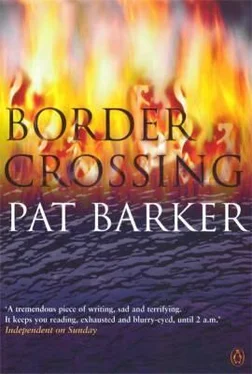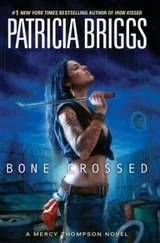Danny whispered, ‘She does come back.’
‘When?’
‘Night-time.’
‘You mean you dream about her?’
‘No, she’s there.’
‘Is this just after you’ve woken up?’
‘Yes.’
‘What do you do about it?’
‘There’s nothing to do. I just look at her.’
‘Do you try to stay awake?’
Yes, he made himself say the twelve times table backwards, and he put toy soldiers round his bed. ‘I pretend they’re my dad.’
‘Do you ever see her during the day?’
‘Yes.’ A second later, ‘But not the same.’
‘What’s it like during the day?’
‘It sort of hits you. Like —’ He brought both hands up to his face, as if he were going to hit himself in the eyes.
‘What do you see?’
‘Her.’
‘What exactly?’
‘Her. At the bottom of the stairs.’
Danny was pleading not guilty, so, in the course of the assessment, Tom could ask no questions about the murder. But Danny admitted being in Lizzie’s house, shortly after the murder. His story was that he’d gone to see Lizzie because she’d told him one of her cats had had kittens and he wanted to see them. The backdoor was open, he thought she must have left it open for him, and so he’d gone in and found her lying dead at the foot of the stairs, the cushion that had been used to kill her lying over her face. He touched her — she was still warm — and lifted the cushion off her face, but put it back again immediately because she looked so horrible. And then he heard footsteps upstairs, realized the murderer must still be in the house, and ran for his life. He ran all the way home, and hid in the barn. He didn’t tell anybody because he was afraid the man would come and kill him if he did.
None of this was true. The forensic evidence for Danny’s guilt was overwhelming, but he was a good liar.
‘So the hairs on your jumper were Lizzie’s?’
‘They were white. I haven’t suddenly turned into an old man, have I?’
Tom waited, then said, ‘Must feel a bit like it, sometimes.’
Danny said nothing. Just wrapped his arms round himself, and hugged his narrow chest.
There were things Danny wouldn’t talk about. He wouldn’t talk at all about his mother. At one point, Tom tried using dolls to get him to speak more freely, but Danny was so uncomfortable playing with them that the attempt had to be abandoned. He had no more idea at the end of the interview than he’d had at the beginning what forces in Danny’s background could have led him to commit such a crime.
On the other hand, a clear picture of Danny’s present mental state did emerge. He was sleeping badly, he had nightmares, he suffered flashbacks, he couldn’t concentrate, he felt numb, he complained that everything around him seemed unreal. But none of these symptoms was any guide to his state of mind at the time of the killing.
Towards the end of the three hours, Tom asked Danny about his fire-setting. Why did he light fires?
‘For a laugh. Everybody does it.’
‘Everybody sets fire to their bedroom?’
Silence. Tom got a box of matches out of his pocket and pushed them across the table to Danny, who tucked his hands more firmly into his armpits.
‘Go on,’ Tom said, ‘light one.’
Slowly Danny reached for the box, his hand creeping across the table like a small animal. A rasp and flare as he struck the match. A doubled reflection of the flame appeared in his eyes, whose pupils had not contracted, as one would have expected, but grown large, as if starved of light.
‘Blow it out when you’re ready.’
Danny swallowed. The flame licked the wood.
‘Danny…’
He didn’t move. Tom leant forward and blew. An acrid smell, a coil of blue smoke hanging in the air like a question mark.
‘Must have hurt.’
Danny shook his head.
‘Let’s see.’
Slowly, the small fist uncurled, revealing fingertips smooth and shiny where the skin had burnt. Danny was staring at him, and Tom had no idea whether this was a deliberate act of defiance, or whether he loved fire so much that he’d been incapable of blowing the match out.
When Tom judged Danny had had enough, he summoned the warder. Danny looked startled, as if the end of the interview came as an unpleasant shock. Tom held out his hand, as he always did after the opening session with a child, but, instead of shaking hands, Danny threw himself into Tom’s arms. For a moment, Tom didn’t move, but it wasn’t in him to reject such a gesture from a child in trouble, and he returned the hug. ‘C’mon, Danny. Don’t cry, it’ll be all right.’ Though he knew it wouldn’t, and Danny had more reason than most to cry.
‘By heck,’ the warder said, as they were walking down the corridor together. ‘You must have a strong stomach.’ Seeing Tom’s expression change, he added defensively, ‘Well, he is a horror, isn’t he?’
It was so common for loving mothers to describe their children as ‘little horrors’ that it was startling to hear the word used in that precise, almost archaic sense. As soon as he got home, Tom looked it up.
In pencil, in the margin of his notes, he’d jotted the definition down:
I (A painful feeling of) intense loathing or fear; a terrified and revolted shuddering; a strong aversion or an intense dislike (of); colloq. dismay (at) 2The quality of exciting intense loathing and fear; a person who or thing which excites such feelings; colloq. a mischievous person, esp. a child.
In Tom’s view there was no point in thinking about Danny, or any other child, in such terms. His job was simply to decide on the degree of Danny’s mental and moral maturity. There were huge gaps in his information — he had no clear picture of Danny’s family, for example — but he thought he had enough to answer the main questions. Could Danny distinguish between fantasy and reality? Did he understand that killing was wrong? Did he understand that death is a permanent state? Was he, in short, capable of standing trial, on a charge of murder, in an adult court? And to all these questions Tom had answered, Yes. Not without doubt, not without qualification, not without many hours of soul searching, but, in the end, Yes.
Tom went to bed late, expecting a bad night, but in fact he fell into a deep sleep almost immediately. Towards dawn he woke, lay for a few moments, dazed, in the half-light, then drifted off again, and dreamt about his father. He was in a crowded pub, edging between the tables with pint glasses in his hand, when he looked down and saw broad shoulders in a herringbone tweed jacket, the back of a curly, grizzled head. ‘Dad?’ he said. The man looked up. It was his father, though with dream logic he had to look at the missing tip of the middle finger on his right hand before he could be sure.
The dream changed. Now they were walking down a street with a high wall on their left. The joy and relief of being able to talk to him again. Then something started to go wrong. ‘I have to go now,’ Dad said. ‘My rabbit’s gone wonky.’ And he shrank, not slowly, but catastrophically, like a balloon when the air’s let out, and became a bit of rag, a scrap of paper, something flying above Tom’s head, over the wall and out of sight. Tom grabbed the top of the wall and scrabbled up. He was looking into an old churchyard, headstones almost hidden by tall grass, and a rabbit running between the graves. A voice said, ‘That’s what a great love comes to — a rabbit running between graves.’
Hearing the voice, Tom realized he was awake, though it took several more minutes for him to realize that the voice was part of the dream. It had moved him deeply. The joy of being with his father, and the sadness of losing him again, remained with him and coloured the day.
Читать дальше












